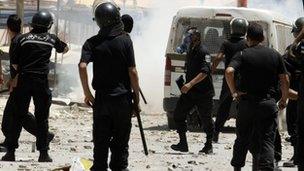Tunisia shaken by 'Islamist protests'
- Published

Rioting began overnight and continued in some parts of the capital on Tuesday
The Tunisian government has condemned a series of attacks on police stations, a court and an art gallery.
Government officials said ultra-conservative Salafist Muslims and criminals were behind the violence, much of which took place overnight.
But the Salafists denied being involved in the rampage, which took place in several areas of the capital Tunis and in the country's north-west.
At least 90 people were arrested in the violence, and seven policemen hurt.
In one northern suburb, La Marsa, rioters tried to force their way into an art gallery where several paintings deemed "blasphemous" had been slashed a day earlier by Islamists.
'Heavy price'
The exhibition included paintings that caricatured Mecca, portrayed a nude woman, and showed the word "Allah" spelled out with strings of ants.
The offices of Tunisia's main labour union in the north-west city of Jendouba were set alight by Salafis overnight, state television reported according to Reuters.
A government spokesman said that police had fired tear-gas as a group of Salafists who torched a local court in west Tunis, the AFP news agency reports.
Several police stations in the north were also attacked, AFP reports.
The country's Justice Minister Nourredine Bhiri said that those behind the violence would "pay a heavy price".
"These are terrorist groups which have lost control, they are isolated in society," he told a Tunisian radio station.
An official from the justice ministry said that those arrested would be brought to justice under a 2003 anti-terror law, AFP reports.
Resurgence
He said some of the violence, which came hours after al-Qaeda leader Ayman al-Zawahiri urged Tunisians to turn against the government, may have been inspired by the group.
The Salafist movement called on Tunisians to protest against "infringements against Islam" but said it had nothing to do with the violence.
Since the fall of Tunisia's autocratic leader Zine al-Abidine Ben Ali, in January 2011, there has been a resurgence of hard-line Islamists in the country.
Some of the Salafists' most radical branches have been holding demonstrations to demand an introduction of Sharia in Tunisia.
- Published26 May 2012
- Published26 March 2012
- Published14 October 2011
- Published9 October 2011
- Published1 October 2011